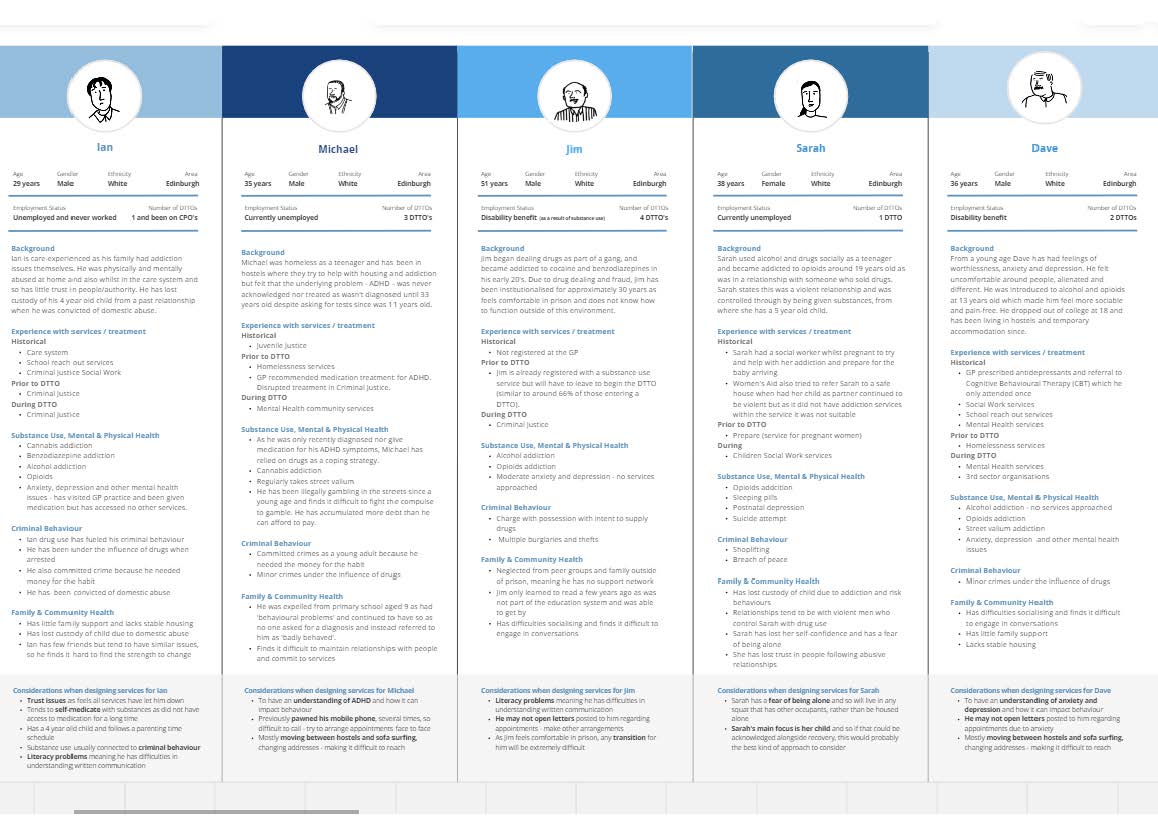Service Design: Personas
About personas
This tool can assist your team in gaining a greater understanding of the range of people who seek support from mental health and substance use services. Personas are created using multiple data sources to create ‘typical’ composite profiles representing a specific user group, their preferences, and the challenges they face. Personas are innovative tools that incorporate the common experiences of service users’, allowing services to design pathways that meet their needs more effectively. Personas are informed by quantitative (service level) and qualitative (service user feedback) data, and can assist in identifying patterns, trends, and characteristics of service users. It is helpful to have someone within your team who is experienced with collecting and interpreting data from multiple sources. The use of personas can help you to:
- Understand the commonalities and challenges experienced by service users.
- Create services and practices that are inclusive.
- Accurately reflect the diversity of those with co-occurring needs who access services.
- Consider what additional resources are needed or where improvements can be made.

Supporting resources for this tool
Supporting the protocol – how you might use this tool:
When looking at adapting and implementing a locally produced protocol, this tool can:
- Further your understanding of the needs of this service user group.
- Identify commonly experienced challenges or elements of good practice for people with co-occurring needs.
- Identify points in the system where people fall through the gaps.
- Enable discussion on what areas could be improved to ensure that people can access the care they need, when they need it.
Planning your workshop
Developing personas should be done as a group activity, that may need to be approached over several sessions after you have gathered evidence from a wide range of sources. The number of sessions needed will be dependent on that data that you use, and the number of people involved. Having several sessions will allow you to have sufficient time to create your personas, as well as time for reflection between sessions and for these reflections to inform the final outputs. The final personas created from your work can then be used within teams and with wider stakeholders to generate change ideas to improve services. The resources section has further tools and guidance to support your planning.
Preparing for the workshop
Click here for support on how to develop Personas.
- Data collection: Arrange a meeting with the person/persons responsible for service/service user data to obtain access. Conduct interviews with service users to obtain firsthand information and insight into lived experience of services and with service experts who have daily contact with service users.
- Using the data: It is best to use a combination of qualitative and quantitative data, from both clinical services and from lived experience feedback. When you have collected all your data, you will need to code your data to organise it. Tools such as Excel spreadsheets or Miro boards can be used to do this collaboratively. You will then need to triangulate your data. It is likely that the data collected will produce several personas. These should be sense checked with service experts, staff and people with lived experience.

What you need for the session
- Data
- Prompt questions
- Excel or Miro
Who should be involved
- Staff and service leads from mental health and substance use services.
- People with lived and living experience and wider stakeholders.
During the workshops
These sessions and work on persona development should not be done without the support and guidance of a service designer.
- Look for patterns in the data, what are the commonalities of people's experiences? There may be patterns relating to gender, psychological traits, general circumstances, difficulties experienced or personal goals. For example, if 50% of the people interviewed mention experiencing unemployment, half of the personas you create should include this.
- Workshops should develop personas further through facilitating in-depth conversations to gain more information such as psychological traits, substances used, what services can assist with specific challenges and what collaborative working could offer to improve people's experience of services and their personal circumstances.
- Focus on solution-based approaches. A tried and tested way to do this is to use your personas and have ideas generation around considerations and opportunities based on commonly cited needs and challenges (identified through your data and any previous workshops). This can be done in person using print outs of your personas and post it notes, or remotely using Miro or Jamboards.
Outputs and next steps
From this workshop you will be able to:
- Have a clear and accurate understanding of your service users.
- Share your personas with stakeholders or experts to ensure that they are accurate and useful.
- Use the personas for further engagement to develop ideas for improvement.
- The following tools for How Might We are a useful next step in using personas to facilitate change.

